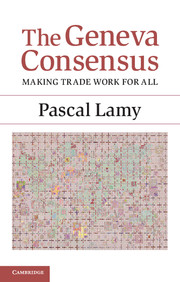Book contents
- Frontmatter
- Contents
- Preface
- 1 Harnessing globalization amid the crisis facing multilateralism
- 2 The changing face of trade
- 3 Helping the poorest up the prosperity ladder
- 4 Trade: friend not foe of the environment
- 5 Trading towards global food security
- 6 Trade can contribute towards better health
- 7 Trade and labour: separated at birth, but still connected
- 8 Trade and energy: the case for a greater WTO role
- 9 Trade and currencies: trading community seeks greater currency stability
- 10 Trade and competition: fairer competition makes for fairer trade
- 11 Trade and human rights: a case of misplaced suspicion
- 12 Corruption: a cancer that trade transparency can help to treat
- 13 Last but not least: the Doha Round
- Epilogue
- Index
13 - Last but not least: the Doha Round
Published online by Cambridge University Press: 18 December 2013
- Frontmatter
- Contents
- Preface
- 1 Harnessing globalization amid the crisis facing multilateralism
- 2 The changing face of trade
- 3 Helping the poorest up the prosperity ladder
- 4 Trade: friend not foe of the environment
- 5 Trading towards global food security
- 6 Trade can contribute towards better health
- 7 Trade and labour: separated at birth, but still connected
- 8 Trade and energy: the case for a greater WTO role
- 9 Trade and currencies: trading community seeks greater currency stability
- 10 Trade and competition: fairer competition makes for fairer trade
- 11 Trade and human rights: a case of misplaced suspicion
- 12 Corruption: a cancer that trade transparency can help to treat
- 13 Last but not least: the Doha Round
- Epilogue
- Index
Summary
This book is laced with references to the Doha Round and its importance for the global economy and the multilateral trading system. The Round – the run-up, the launch, the negotiations – was a fundamental part of my professional life for nearly fifteen years, first as EU Trade Commissioner and then as WTO Director-General. I think I can safely say that I know it better than almost anyone, better probably than anyone would want to know it. So what has happened, and perhaps more importantly, what should happen to bring finally the long-running saga to a close?
Let’s begin by reaffirming why the Doha Round – also known as the Doha Development Agenda – was and is needed. WTO rules were last updated in 1995 and it is clear that the existing regulations are both unfair and increasingly outdated. It is inequitable that the rules permit countries to pour billions of dollars into agriculture programmes in the form of subsidies, subsidies that have impoverished developing country farmers over the last three decades by making it difficult for them to compete on world markets. It is unjust that the WTO tariff system allows countries to hit exports from poor countries with duties three or four times higher than those applied to exports from wealthier countries. It is impossible to keep providing subsidies which contribute to overfishing our oceans.
- Type
- Chapter
- Information
- The Geneva ConsensusMaking Trade Work for All, pp. 164 - 185Publisher: Cambridge University PressPrint publication year: 2013



